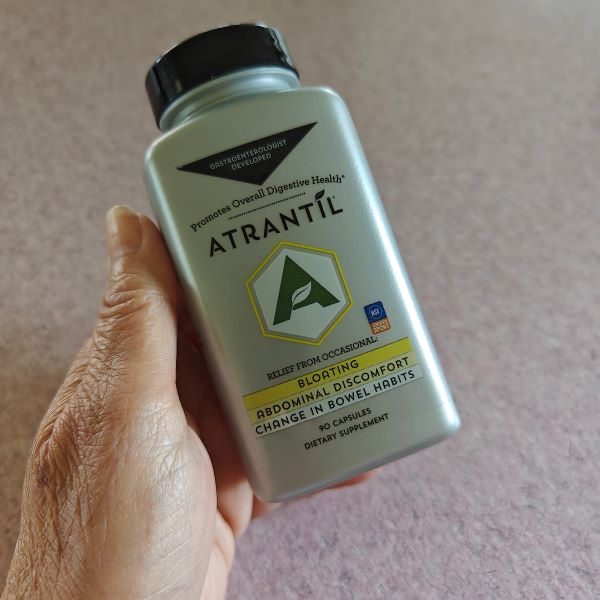The product in the post was sent to us by the brand. Please note that we retain the right to not place an item that we don’t truly love. FYI, I am still using this product because it has worked for me. Your results may differ.

It feels like forever that I’ve struggled with gastrointestinal issues. In reality, it’s been the past few years. Maybe it is because of aging, maybe it’s because I sit all day on this computer writing articles and don’t get the exercise that I used to, maybe it’s my diet, or maybe it’s just that my gut has been abused by years of poor eating habits. It doesn’t really matter at this point, since my gut isn’t going into therapy anytime soon (although I imagine that my gastro doctor understands the complaining gurgles coming from inside of me).
Whatever the reason, I know that it’s not just me and it’s a topic that many of us shy away from discussing openly, but for those of us living with these problems, it can dominate our daily lives. My journey to heal my microbiome has been long, winding, and filled with both hope and frustration. I want to share my personal experience, what has worked for me, what hasn’t, and what I still have to do.
The Beginning of My Struggle
My gastrointestinal issues began subtly enough, with occasional bouts of bloating and discomfort. As time went on, these episodes became more frequent and severe, evolving into bloating, persistent abdominal pain, and now chronic constipation (yes, that’s the look on my face). I felt isolated and embarrassed, reluctant to talk about my symptoms even with my doctor. As someone who writes about health a lot, I tend to push my problems on the back burner.
I hoped that the doctor would say something to me after my colonoscopy last year, but NOPE, it was as if nothing was wrong. Then again, after drinking jugs of that horrible prep, what was there to see? I did mention it at my visit and after a year (yes, that’s what I do) I made an appointment to talk about it. The prescription? Taking a laxative twice a day….yes, the same laxative that many doctors use FOR the colonoscopy prep. The first day…it did NOTHING, the second I felt 10 lbs lighter, but by the 3rd day I couldn’t leave the house without severe cramping and bathroom sprints. This wasn’t going to work.
In my usual way, I decided that I knew better than the doctor. I mean, he offered me a solution that actually made me feel WORSE.
Understanding the Microbiome
Frustrated with the lack of answers, I began researching on my own and stumbled upon the concept of the gut microbiome. The microbiome is the complex community of microorganisms that live in our digestive tracts. These microbes play a crucial role in digesting food, producing essential nutrients, and regulating the immune system.
The more I learned, the more I believed that an imbalance in my gut microbiome might be contributing to my symptoms. This belief set me on a path to try and heal my gut from the inside out.
Diet: The First Line of Defense
One of the first things I tried was changing my diet. I started with the low FODMAP diet, which eliminates certain carbohydrates that are difficult for some people to digest. This diet gave me some relief but was incredibly restrictive and difficult to maintain long-term. I also experimented with gluten-free and dairy-free diets, which again provided temporary relief but were not sustainable for me.
I found that incorporating more fiber-rich foods like fruits, vegetables, and whole grains helped regulate my bowel movements to some extent. However, too much fiber caused additional bloating and discomfort and sometimes made the problem worse (don’t ask me what Chia Seeds did to me…let’s just say I never felt WORSE). It was a delicate balance.
Probiotics: Help or Hype?
Probiotics, the so-called “good” bacteria, seemed like a natural next step. I tried various over-the-counter probiotic supplements and foods like yogurt and kefir. Unfortunately, these seemed to have little effect on my symptoms. Some probiotics even made my bloating worse. I learned that not all probiotics are created equal, and their effects can be highly individual. I had bought a fancy-named probiotic with a gazillion numbers on it and…NOTHING. I DID go back to using SEED and it helped. The bloating lessened and there were moments that I could actually go. But, even that was short-lived.

Atrantil: For Me It’s Been A Game Changer
After much trial and error, I came across Atrantil, a supplement specifically designed to target the overgrowth of bacteria in the small intestine (SIBO), which can be a common underlying cause of IBS. It works by combining natural ingredients like quebracho extract, horse chestnut, and peppermint to reduce gas production and improve gut motility.
Skeptical but hopeful, I decided to give it a try. To my surprise, I noticed a significant reduction in bloating and abdominal discomfort within the first few weeks. Unlike many other treatments I’d tried, Atrantil seemed to address the root cause of my symptoms rather than just masking them. It wasn’t a cure-all, but it was a substantial improvement. You take 2 pills with each meal, but I do forget and it results in a little back-pedaling for me. I have to be extremely vigilant about taking it and even then, while the bloating and pain are completely gone I still struggle. When I’m pairing the Atrantil with plenty of good fiber, I’m all good. When I decide that white pasta and meatballs are what I’ve been craving – I’m miserable.
Lifestyle Changes: Beyond Diet and Supplements
As you can see, healing the microbiome is not a single path, in addition to dietary changes and supplements, I found that lifestyle factors played a crucial role in managing my symptoms. Stress, in particular, had a profound impact on my gut health. High-stress periods would often trigger flare-ups, so I’m starting to incorporate stress-reducing practices into my routine.
I also made a conscious effort to get regular exercise, which helped regulate my digestion and boost my mood. Adequate sleep was another important factor; poor sleep often exacerbated my symptoms.
What Didn’t Work
While I had some success with diet, Atrantil, and lifestyle changes, there were plenty of things that didn’t work for me. For instance, I tried a variety of herbal remedies like ginger and turmeric, which are often touted for their anti-inflammatory properties. Unfortunately, they provided little to no relief.
I also experimented with various elimination diets, including cutting out nightshades, and lectins, and even following the paleo diet. These were not only difficult to maintain but also didn’t significantly improve my symptoms.
The Emotional Toll
Living with chronic gastrointestinal issues took an emotional toll on me. I often felt anxious about eating out or traveling, unsure of how my body would react. Social events became a source of stress rather than enjoyment. I experienced bouts of frustration, feeling like I would never find relief.
Looking Ahead
My journey to heal my microbiome is ongoing. While I’ve found strategies that work for me, I continue to explore new approaches and stay informed about the latest research in gut health. I’ve learned that managing gastrointestinal issues often requires a multifaceted approach, including diet, lifestyle changes, and targeted supplements like Atrantil.
Practical Tips for Healing Your Microbiome
Based on my experience, here are some practical tips for anyone struggling with gastro-intestinal issues:
- Start with Diet: Experiment with different diets to see what works for you. Consider trying the low FODMAP diet or eliminating gluten and dairy, but be prepared to adjust based on your body’s response.
- Introduce Probiotics Carefully: Not all probiotics are the same. Start with small doses and pay attention to how your body reacts. You may need to try different strains to find one that helps.
- Consider Targeted Supplements: Atrantil has been a game-changer for me. If you suspect SIBO or have persistent bloating, it might be worth a try.
- Manage Stress: Incorporate stress-reducing practices like meditation, yoga, or deep breathing exercises into your daily routine. Stress has a significant impact on gut health.
- Stay Active: Regular exercise can help regulate digestion and improve overall well-being. Find an activity you enjoy and make it a part of your routine.
- Prioritize Sleep: Poor sleep can worsen gastrointestinal symptoms. Aim for 7-9 hours of quality sleep per night.
- Seek Support: Connect with others who have similar experiences. Online forums, support groups, and therapy can provide emotional support and practical advice.
- Work with Professionals: Don’t hesitate to seek help from medical professionals, including gastroenterologists and nutritionists. They can provide valuable guidance and help you navigate your journey.
Healing your microbiome and managing gastrointestinal issues is a complex and highly individual process. What works for one person might not work for another. Through trial and error, I’ve found a combination of diet, lifestyle changes, and targeted supplements like Atrantil that significantly improve my symptoms.
Living with chronic digestive issues can be challenging, but it’s important to stay hopeful and persistent. With the right approach and support, it is possible to find relief and improve your quality of life. My journey is a testament to the power of perseverance and the importance of listening to your body. If you’re on a similar path, I hope my story provides some insight and encouragement. You are not alone, and there is always hope for better days ahead.
More Info:
Atrantil underwent multiple clinical trials and was included in a study by Northwestern University Feinberg School of Medicine presented by the American College of Gastroenterology. The study found that Atrantil significantly improved bloating, gas, abdominal discomfort, and constipation. The second showed which microbes cause IBS.
What’s inside Atrantil?
Polyphenols: These occur naturally in fruits, vegetables, and other plant-based foods and are known for their antioxidant and anti-inflammatory properties. Atrantil helps balance the microbiome using a unique polyphenol formula.
- Peppermint extract: A natural antispasmodic, the whole leaf extract (not just the oil) helps relax the small bowel to enhance the functions of Atrantil’s other hardworking extracts. It makes it easier to expel trapped gas and is known for its antibacterial properties.
- Quebracho colorado extract: This powerful antioxidant and complex polyphenol soaks up free hydrogen (a cause of problematic gas production), binds to the cell wall, and disrupts the archaebacteria, which weakens the methane-producing bacteria.
- Horse chestnut extract: A natural inhibitor to the enzyme that allows methane to be produced, this extract enters the archaebacteria cell through the disrupted cell wall and shuts down the methane-producing enzyme.
Atrantil is vegan and gluten-free, made in Canada, non-GMO project verified, and NSF Certified for Sport. The supplement includes three natural extracts backed by science and works as a pre- and post-biotic. When taken up to three times per day with food, it can profoundly improve the health of the gut microbiome and beat bloating. For more information visit Atrantil.ca

